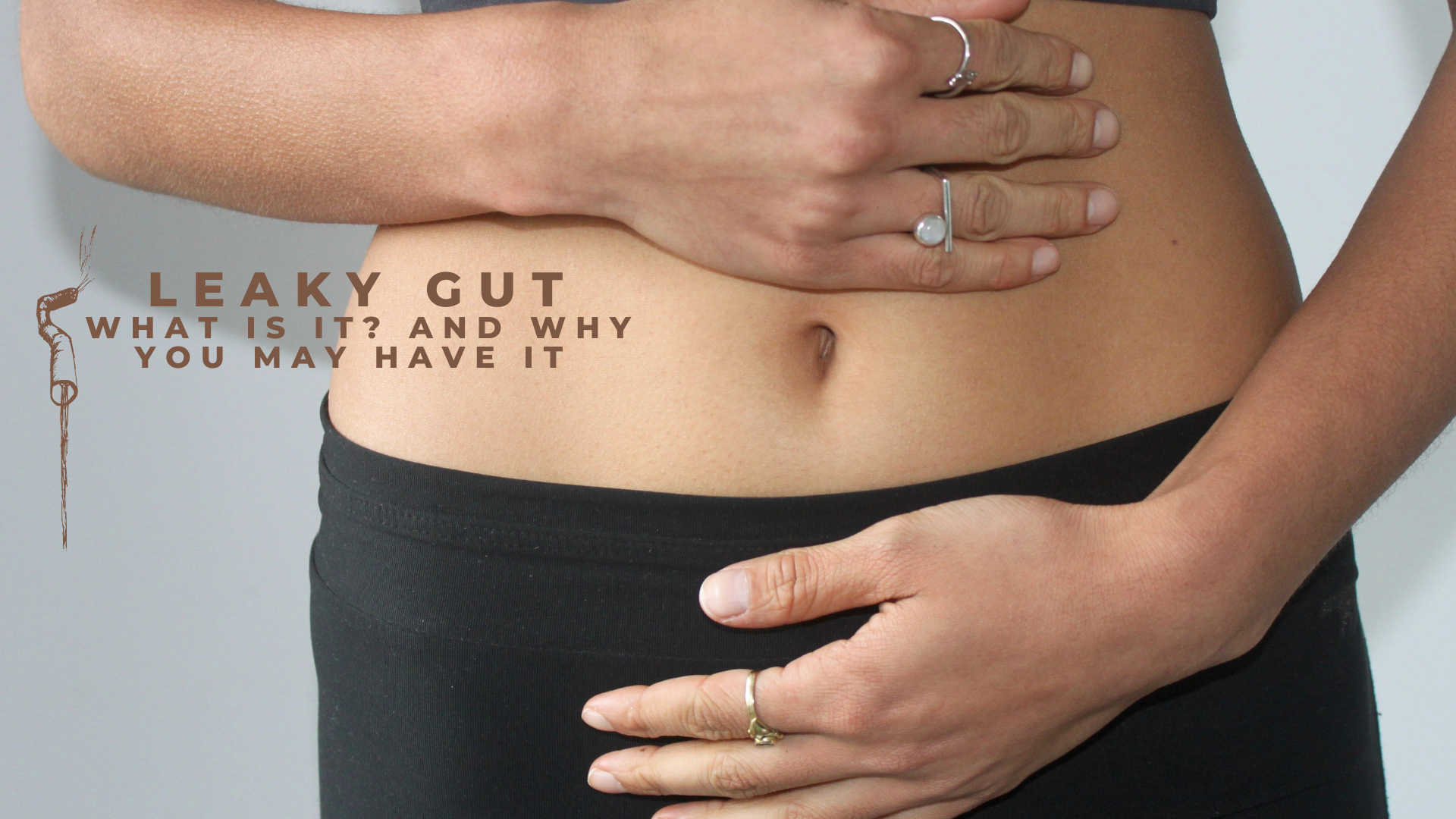
Has Dr Google ever told you that the cause of your stomach pain is some weird condition called leaky gut (along with appendicitis, food poisoning, gallstones and heartburn)?
So, what is leaky gut, and why may you have it?
What Is Leaky Gut?
To discover what a leaky gut is, we need to understand how the digestive system works.
Our intestines are lined with cells that bind together to form tight junctions. When these junctions are working correctly, they form a barrier that acts as a security guard, controlling what gets absorbed into the bloodstream and preventing the entry of larger particles, pathogens and toxins.1
When it’s not working correctly, this barrier can loosen, which allows partially digested foods, toxins and bugs to penetrate the tissue and enter the bloodstream. This may trigger inflammation and disrupt the balance of bacteria within the gastrointestinal microbiome. Leaky gut is the broad term for increased intestinal permeability, as it’s in this state, toxins, foods, and bacteria can ‘leak’ through the gut into the bloodstream.1
Leaky gut isn’t really a condition but a sign that something in the body is causing these tight junctions to become more permeable.

Symptoms of Leaky Gut:
· Acne
· Bloating
· Brain Fog
· Constipation
· Depression
· Diarrhoea
· Eczema
· Fatigue
· Flatulence
· Headaches
· Nausea
· Nutritional Deficiencies
Why Do People Get Leaky Gut?
I’m sorry to break it to you; most of us have some degree of leaky gut, as this barrier is not entirely impenetrable. There are several reasons, including poor dietary choices, alcohol, overuse of medications, inflammatory bowel disease, infections, a poor balance of gut bacteria, stress and environmental toxins, that can render one’s gut ‘leakier’ than someone else’s.
Below are some more in-depth causes of leaky gut.
Modern Life
The modern world, particularly the modern-day diet and lifestyle, may be a driver of gut leakiness. Now, I’m not going to tell you to shave your hair, book a one-way ticket to a Buddhist monastery, throw your phone out on the way there and only eat fruit and vegetables for the rest of your days. Still, evidence suggests that the standard diet we eat, which is low in fibre and high in sugar, alcohol and caffeine, can disrupt gastrointestinal bacteria and increase intestinal permeability.1
Is it Zonulin?
Zonu-what? Let me explain. There’s a protein in the body known as zonulin, which, when released, weakens the tight junctions surrounding the gut.2
Alcohol
When drunk in excess, alcohol can overwhelm the gastrointestinal tract and liver, damaging the gut and other organs.3 Both the small and large intestine can be affected by alcohol, leading to a chronic state of intestinal inflammation, which increases intestinal permeability.
Stress
Both acute and chronic stress can provoke inflammation, modulate gut bacteria and increase gut barrier permeability.4-5 One research study found that as university students’ stress increased throughout the semester, their health-promoting bacteria decreased; showing the impact stress has on the gut.6
How to Help Manage Leaky Gut
1. Goodbye Gluten
Gluten is often called out as the leading cause of leaky gut because it’s linked to zonulin release.2 Common sources include bread, pasta, noodles, pastries, cereal, granola and beer. Try swapping out your regular noodles for my Zoodles here.
2. Say Sayonara, Sugar
Sugar, including white sugar, coconut sugar, honey and high-fructose corn syrup, wreak havoc on the gut by feeding the gastrointestinal microbiome harmful bacteria and weakening the barrier. I recommend limiting your sugar intake to a maximum of six teaspoons daily. While this may sound like a piece of (gluten/dairy/sugar-free) cake, be sure to count the sugars hiding in your sauces, takeaway foods and pre-packaged foods.
3. Let Go of Lectins
Lectins are found in legumes, grains, beans and corn. They bind to the cells lining the intestines and disrupt the tight junctions between the intestinal cells, contributing to a leaky gut. Don’t get me wrong – in small amounts, lectins can boost immune function and support cell growth. However, high intakes can hinder the absorption of specific vitamins and damage the lining of the intestines. If you are concerned about lectins, make sure you eat legumes that have been cooked, fermented or soaked and sprouted.
4. Adios Alcohol
To reduce the risk of harm from alcohol, I recommend drinking no more than ten standard drinks a week and no more than four standard drinks on any day.7 In truth, the less alcohol you drink, the better for your gut.
5. Hello, Healthy Fats
Quality fats, such as nuts, seeds, avocado, olive oil and fatty fish, can reduce inflammation, thereby tightening the junction of the gut. Plus, healthy fats can help support the absorption of specific nutrients. Increase your fats with my Crispy Salmon with Saffron, Aioli and Smashed Green Peas. It’s delicious.
6. Favour Fulvic Humic Acid

Fulvic acid, known as Shilajit in India, has been used in Ayurvedic medicine for over 3000 years due to its medicinal properties. Fulvic acid is a subclass of diverse compounds known as humic substances, which are a by-product of organic degradation from microorganisms in the soil. I know what you’re thinking - how is this relevant to leaky gut? Well, fulvic acid can support the integrity of the gut lining and replenish the microbiota, increasing the bioavailability and absorption of nutrients through enhancing digestive enzymes, like proteases – it’s the best friend your gut didn’t know it needed.8 Supercharged Food’s Fulvic Humic Acid goes beyond probiotic consumption by strengthening the tight junctions of the gut lining. Plus, it’s an anti-viral, anti-inflammatory and an antioxidant. Find out more about it here.
7. Variety of Vegetables
Vegetables are rich in prebiotic fibre, which help feed the healthy probiotic bacteria in the gut, essential for a healthy gastrointestinal microbiome. If you need help getting in more vegetables, my Roasted Sweet Potato with Basil Pesto and Chopped Salad is my go-to. Get the recipe here.
8. Bring on the Bone Broth
Bone broth heals the mucosal lining of the digestive tract and aids in the digestion of nutrients. Bone broth is also rich in glutamine, an amino acid that reduces intestinal permeability. My Beef Pho Broth is my favourite gut-healing remedy.

9. It’s Zen Time
We know that stress can impact our digestion and overall gut health so, it’s time to manage your stress. If you’re looking for a new stress management technique, I can’t recommend Vedic Meditation enough; it’s seriously changed my life. Other stress management techniques include deep breathing, moving your body, journaling, and speaking through your issues with close friends, family members, professional therapists, and counsellors.
Thank you for tuning in to Part 2 of my Supercharge Your Gut Health Series. If you missed last week’s deep dive into IBS, click here. Also, be sure to let me know if you’re enjoying the series in the comments below.
Source : Lee Holmes. Supercharged Food.
References
1 Mu, Q., Kirby, J., Reilly, C. M., & Luo, X. M. (2017). Leaky Gut As a Danger Signal for Autoimmune Diseases. Frontiers in immunology, 8, 598. https://doi.org/10.3389/fimmu.2017.00598
2Fasano A. (2012). Zonulin, regulation of tight junctions, and autoimmune diseases. Annals of the New York Academy of Sciences, 1258(1), 25–33. https://doi.org/10.1111/j.1749-6632.2012.06538.x
3Bishehsari, F., Magno, E., Swanson, G., Desai, V., Voigt, R. M., Forsyth, C. B., & Keshavarzian, A. (2017). Alcohol and Gut-Derived Inflammation. Alcohol research: current reviews, 38(2), 163–171.
4 Madison, A., & Kiecolt-Glaser, J. K. (2019). Stress, depression, diet, and the gut microbiota: human-bacteria interactions at the core of psychoneuroimmunology and nutrition. Current opinion in behavioral sciences, 28, 105–110. https://doi.org/10.1016/j.cobeha.2019.01.011
5 Galley, J.D., Nelson, M.C., Yu, Z. et al. Exposure to a social stressor disrupts the community structure of the colonic mucosa-associated microbiota. BMC Microbiol 14, 189 (2014). https://doi.org/10.1186/1471-2180-14-189
6 Knowles, S. R., Nelson, E. A., & Palombo, E. A. (2008). Investigating the role of perceived stress on bacterial flora activity and salivary cortisol secretion: a possible mechanism underlying susceptibility to illness. Biological psychology, 77(2), 132–137. https://doi.org/10.1016/j.biopsycho.2007.09.010
7Australian Government Department of Health (2020). Australian Alcohol Guidelines.
8 Winkler, J., & Ghosh, S. (2018). Therapeutic Potential of Fulvic Acid in Chronic Inflammatory Diseases and Diabetes. Journal of diabetes research, 2018, 5391014. https://doi.org/10.1155/2018/5391014














← Older Post Newer Post →